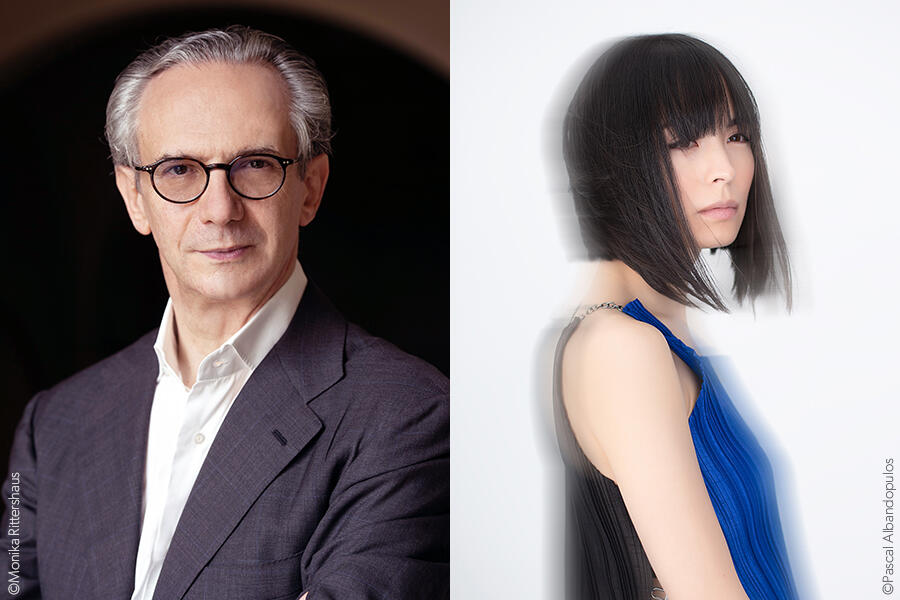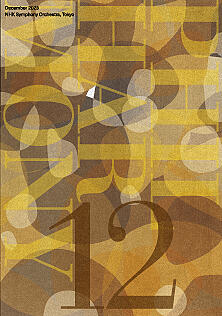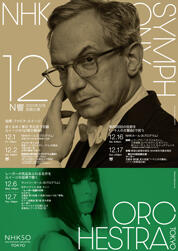- Home
- Concerts
- Subscription Concerts 2023-2024
- Program B
- No. 1999 Subscription (Program B)
No. 1999 Subscription (Program B)

Program
Haydn / Symphony No. 100 G Major Hob. I-100, Military
Music history has witnessed capable impresarios who have made opportunities for composers to create timeless masterpieces. Besides Sergei Diaghilev (1872–1929) who commissioned talented composers to write innovative ballet scores such as The Rite of Spring by Stravinsky, Johann Peter Salomon (1745–1815) deserves special attention. This German concert producer and violinist who was active in the UK from the early 1780s twice made happen Haydn’s fruitful sojourns in London.
For his residencies in the music capital (1791–1792/1794–1795), Haydn in his mature period penned twelve symphonies (Nos.93–98/Nos.99–104) which are collectively called the Salomon (or London) Set. Since No. 94 Surprise enthralled Londoners during his first stay, Haydn might have seen No. 100 as a symphony with another enjoyable “surprise” for local curious audiences. The nickname Military, not by the composer, is given after the unusual instrumentation including a triangle, cymbals and a bass drum: these three typify the Turkish Janissary (infantry) bands whose music was greatly popular in Europe at the time (Wolfgang Amadeus Mozart’s Piano Sonata K. Haydn keeps back his mini-Turkish band until the trio (central) section of the second movement. Then we hear an unexpected trumpet fanfare followed by a timpani roll immediately before the orchestra, together with the Turkish band, ends this unique Allegretto movement. After the third movement, an elegant Classical minuet, our Turkish band comes back at the finish of the brisk final movement.
[Kumiko Nishi]
Liszt / Piano Concerto No. 1 E-flat Major
“What a violin! (…) Heavens! What sufferings, what misery, what tortures in those four strings!” exclaimed the twenty-year-old Liszt in 1832, after attending a concert of the violinist Niccolò Paganini for the first time. Liszt, a future piano virtuoso who had already been trained by the renowned teacher Carl Czerny (Beethoven’s pupil), made then a firm resolution to be “Paganini of the piano.” Between 1839 and 1847, Liszt carried out a recital tour on unheard-of scale from the Urals to the Pyrenees, exploiting technical and expressive potential of his instrument as a composer-pianist.
The initial sketches of his Piano Concerto No. 1 date from the early 1830s and the first version was finished in 1835. It was since elaborately revised several times to be completed in 1856, provided that the first public performance by Liszt on the keyboard and Hector Berlioz on the podium was held in 1855 in Weimar. Ahead of his time, the concerto made Liszt a target of fault-findings by contemporary conservatives the best-known of whom was the critic Eduard Hanslick who called it scornfully “Triangle Concerto.” The unexpected, frequent use of a triangle particularly at the starts of the last two movements is indeed noteworthy. The concerto consists of four movements performed seamlessly in a style of fantasy. The imposing theme announced at the very beginning of the first movement is “cyclic,” as it will recur repeatedly in various disguises through to the ultra-virtuosic closing of the work.
[Kumiko Nishi]
Reger / Variations and Fugue on a Theme by Mozart Op. 132
Reger’s style was founded on the Austro-German Baroque/Classical music from Bach, Mozart, Beethoven to Brahms, anticipating the neo-Classical movement launched by Igor Stravinsky (1882–1971) a few years after Reger’s death. A solid contrapuntal (polyphonic) writing that he mastered as a Bach-admirer as well as rich late-Romantic harmonies in the style of Liszt and Wagner gave Reger’s traditionalist stance a depth and modernness.
Written around the outbreak of World War I, “Variations and Fugue on a Theme by Mozart” (1914) was premiered under Reger’s baton in Wiesbaden in 1915, a year before he passed away. “A theme” is the one from the first movement (also a theme and variation) of Mozart’s Piano Sonata in A major with Turkish March K. 331 (1783). At the commencement, Reger states the exquisite and faintly melancholic theme faithfully – in Andante grazioso (graceful) in A major as with Mozart – mainly on oboe. This is followed by its eight variations and an elaborate fugue on a subject derived from Mozart’s theme. The seventh variation in F major (marked again Andante grazioso) which restates the theme in the almost original form in a polyphonic texture leads to an elegiac opening of the truly late-Romantic, dramatic eighth variation. This extensive final variation and the ensuing vast fugue account for nearly a half of the entire work: such greater gravity Reger placed on the denouement lets us bask in the compelling afterglow of listening. His musical homage to the past ends with the fugue’s grand coda where trumpets and horns recall Mozart’s A-major theme brilliantly.
[Kumiko Nishi]
[Encore]
Dec 6: Satie / Gnossienne No.1
Dec 7: Arvo Pärt / For Alina
Piano: Alice-Sara Ott
Artists
 ConductorFabio Luisi
ConductorFabio Luisi
Fabio Luisi hails from Genoa. He is the Principal Conductor of the Danish National Symphony Orchestra and the Music Director of the Dallas Symphony Orchestra. He first conducted the NHK Symphony Orchestra in 2001, and in September 2022 he became Chief Conductor of the orchestra. In the 2022–23 season, his first season after assuming the post, Fabio Luisi conducted Verdi’s Requiem to commemorate his appointment in September. He has presented works of German and Austrian composers such as Beethoven, Brahms, Bruckner and R. Strauss as well as those of Franck and Saint-Saëns, Francophone composers, and with his conducting style full of passion and poetic sentiment, has captured the hearts of many of audience members. In August 2023, his tenure as Chief Conductor was extended by three years until August 2028.
He was General Music Director of the Opernhaus Zürich, Principal Conductor of the Metropolitan Opera in New York, Principal Conductor of the Wiener Symphoniker, as well as General Music Director of the Staatskapelle Dresden and the Sächsische Staatsoper, Artistic Director and Principal Conductor of the MDR Sinfonieorchester Leipzig, Music Director of the Orchestre de la Suisse Romande and Chief Conductor of the Tonkünstler Orchester. He is Music Director of the Festival della Valle d’Itria in Martina Franca (Apulia) and has appeared as guest conductor with numerous renowned ensembles, including the Philadelphia Orchestra, the Cleveland Orchestra, the Münchener Philharmoniker, the Filarmonica della Scala, the London Symphony Orchestra, the Royal Concertgebouw Orchestra, and the Saito Kinen Orchestra, while also conducting operas at world’s major opera houses. Important recordings include Verdi, Bellini, Schumann, Berlioz, Rachmaninov, Rimsky-Korsakov, Frank Martin, and Franz Schmidt, the largely forgotten Austrian composer. In addition, he has recorded various symphonic poems by Richard Strauss, and a lauded reading of Bruckner’s Symphony No. 9 with the Staatskapelle Dresden. His recordings of Wagner’s Siegfried and Götterdämmerung with the Metropolitan Opera won Grammy awards.
 PianoAlice-Sara Ott
PianoAlice-Sara Ott
Alice-Sara Ott signed an exclusive contract with a prestigious German classical music label at the age of nineteen. Since her spectacular debut at the age of twenty by releasing the album of Liszt’s Transcendental Etudes, she has consistently redefined classical music from an advanced and creative perspective, and continues to offer innovative presentations. Her 10th album titled Echoes of Life released in 2021 has made headlines because of the combination of Chopin’s preludes and contemporary works, and her new form of concerts on Echoes of Life in collaboration with architect Hakan Demirel, using video works, were successful in London, Paris, Munich, and Tokyo.
Until now she has worked with renowned orchestras such as the Berliner Philharmoniker, the Los Angeles Philharmonic, the London Symphony Orchestra, the Philharmonia Orchestra, and the Wiener Symphoniker. An album of Beethoven’s Piano Concerto No.1 which she played with the Netherlands Radio Philharmonic Orchestra conducted by Canellakis was released in autumn this year. This is her fifth appearance since her first collaboration with the NHK Symphony Orchestra in 2012, after an absence of five years. Under the baton of Fabio Luisi, she will delight her audience by weaving a bold, exhilarating, yet delicate sound in Liszt’s Piano Concerto No. 1.
[Arisa Iida, music facilitator]
Download
Ticket
Program B
No. 1999 Subscription (Program B)
Suntory Hall
Google Map
Seating Chart
Single Tickets Release Date
Pre-sales for Subscribers:Thursday, October 26, 2023
*about subscribers
Sale to General Public:Sunday, October 29, 2023
Price
| S | A | B | C | D | |
|---|---|---|---|---|---|
| Ordinary Ticket | 9,800 | 8,400 | 6,700 | 5,400 | 4,400 |
| Youth Ticket | 4,500 | 4,000 | 3,300 | 2,500 | 1,800 |
Seating chart Enlarge Print PDF
*tax included
*Subscribers receive a 10% discount (Available at NHKSO WEB Ticket and N-Kyo Guide)
*For wheelchair-accessible seats, please refer to the N-Kyo Guide
Youth Tickets
Youth Tickets are great options for those of 25 years old and younger
Subscription tickets
Release Date
ANNUAL SUBSCRIPTION TICKETS
Mon., July 17, 2023 10:00am
[For Subscribers: Sun., July 9, 2023 10:00am]
SEASONAL SUBSCRIPTION TICKETS (WINTER)
Tue., Oct. 17, 2023 10:00am
[For Subscribers: Thu., Oct. 12, 2023 10:00am]
Where to buy
NHKSO WEB Ticket | Wednesday, December 6 (In English / Seats not selectable)
NHKSO WEB Ticket | Thursday, December 7 (In English / Seats not selectable)
NHKSO WEB Ticket (In Japanese only / Seats selectable)
N-Kyo Guide (Purchase by telephone only)
Broadcast
 NHK-FMNo. 1999 Subscription (Program B)
NHK-FMNo. 1999 Subscription (Program B)
Friday, Dec 15, 2023 7:30PM - 9:10PM
Program:
Haydn / Symphony No. 100 G Major Hob. I-100, Military
Liszt / Piano Concerto No. 1 E-flat Major
Reger / Variations and Fugue on a Theme by Mozart Op. 132
Conductor:Fabio Luisi
Piano:Alice-Sara Ott
Recorded:December 6, 2023 Suntory Hall
*Repertoire, conductor, soloists and program order are subject to change without notice.
*Pre-school children are not allowed in the concert hall



